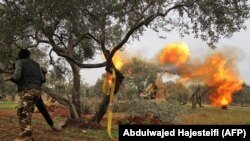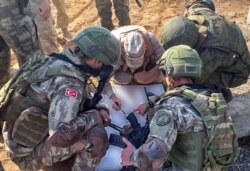Late night local time, Thursday, Feb. 27, Turkish sources on social media began sharing information about an airstrike by “forces of the Bashar Assad regime” in the Idlib area of Syria that killed dozens of Turkish troops. The airstrike unleashed a series of dramatic events and diplomacy amid frantic fears of escalated fighting.
Then official reports came in, reporting the deaths of 33 Turkish troops in the area of northwestern Syria. Turkish officials attributed the airstrike to Syrian government forces, but Russia has largely been conducting the air war for the Syrians.
In the aftermath of the strike, Turkey’s President Recep Tayyip Erdoğan held an emergency national security meeting, and Ankara consulted with its allies – the U.S. and European nations in the North Atlantic Treaty Organization (NATO).
Turkish media reported protests in front of the Russian consulate in Istanbul.
By Friday morning, reports said Erdoğan had spoken with Russian President Vladimir Putin, with both agreeing to meet face to face “soon.”
Then, Defense Minister Hulusi Akar announced that Turkish forces had conducted a retaliatory strike against Syrian government forces in Idlib, hitting 200 targets and “neutralizing” at least 329 Syrian government troops.
Russia said it had deployed to the Middle East two of its most advanced navy ships – the Admiral Grigorovich and the Admiral Makarov.
Russia, for its part, denied involvement in any airstrikes on Turkish troops or having knowledge that Turkish troops were present in the area where strike reportedly took place.
“Turkish servicemen inside the combat units of terrorist groups came under fire from the Syrian military on February 27 near the town of Behun,” the Russian defense ministry said in a statement. “According to the data submitted by Turkey to the Russian Reconciliation Center in Syria, there were no Turkish soldiers near Behun.”
The Russian defense ministry claim is misleading and inconsistent with past admissions of providing air support for Assad regime forces.
Idlib is the last enclave of the Syrian opposition resistance in the civil war, which has raged since 2011. According to a September 2018 agreement, Ankara and Moscow declared the city a “de-escalation zone,” and Turkey was supposed to be in control of the situation on the ground there.
But the Syrian government broke the treaty in April 2019 with an offensive against Idlib, and pro-Assad troops gradually advanced to control parts of Idlib and its surroundings. The rest of the city has remained under the rebels’ control.
Turkey repeatedly has demanded that Russia persuade Assad to leave Idlib and allow the sides to resume the de-escalation agreement. Russia accused Turkey of violating the treaty by not clearing the area of terrorist groups. The agreement requires Turkey and Russia to coordinate their military activity in the area, including by sharing the location of each other troops at any given time.
Erdogan had repeatedly warned Russia that his troops would launch an offensive against pro-Assad forces by the end of February if they failed to leave the area.
All of this suggests that Russia’s claim it did not know Turkish troops were in the Idlib area is misleading.
Defense Minister Akar said Russia well knew the location of Turkish troops.
"This attack occurred even though the locations of our troops had been coordinated with Russian officials in the field,” Akrar told journalists in the town of Hatay, near the Syrian border. “ Despite warnings after the first strike, the Syrian regime unfortunately continued its attacks, even targeting ambulances.”
Russia’s claim that its air force was not involved in Thursday’s attack is contradicted by news and analyst reports, as well as precedent.
According to the Al-Monitor, a top Middle East news and analysis website, the attack against Turkish troops was carried out by two Russian Sukhoi Su-24 and two Syrian Su-22 fighter jets. Al-Monitor provided a detailed report, citing its sources on the ground.
“A first, a relatively lighter strike by the Su-22s forced the convoy to stop, after which the pounding intensified, forcing the soldiers to take shelter in several roadside buildings. What followed next was likely the dropping of KAB-1500L bombs — a variation of advanced laser-guided bunker buster bombs capable of penetrating to depths of up to 20 meters (65 feet) — by the Russian jets. Two of the buildings collapsed in the attack, leaving the Turkish soldiers under the rubble.”
Other sources gave a similar account.
Since Russia’s official involvement in the Syrian war began in 2015, the Russian air force has been the main military power behind the Bashar al Assad regime. The United Nations has accused Russia of “war crimes” for indiscriminate bombing of civilian populated areas and causing thousands of deaths.
Top Russian military commanders repeatedly have bragged about how much their air forces learned from the Syrian operation, which also became a testing ground for new Russian weaponry.
As the confrontation between Turkey and Russia escalated, Turkey also announced it would no longer hold Syrian refugees (in accordance with the 2016 agreement between Turkey and the EU) and opened its borders for them to cross over into Europe.
Videos of crowds of refugees running in the dark across Turkey’s borders into Greece flooded the social media. Turkey has been hosting 2.9 million to 3.5 million Syrian refugees since the war in Syria began in 2011.
The Associated Press reported that Greek police on the border with Turkey used tear gas and flash grenades to move migrants back at the Kastanies crossing. Bulgaria beefed up security on its Turkish border, and its prime minister, Boyko Borissov, cited ``a real threat'' of a new migrant wave.
Social media monitoring groups reported that YouTube and WhatsApp, among other platforms, had been blocked or limited in Turkey.
NATO announced it will hold emergency consultations on Friday after Turkey invoked Article 4 of the alliance, claiming its territorial integrity, independence and security had been threatened.
Political and military observers have started discussing the possibility of a direct military confrontation between Turkey and Syria, and even between Turkey and Russia. NATO’s Article 5 states that “an attack against one ally is considered an attack against all allies,” including the U.S. and the alliance’s 27 European members.
The White House said President Donald Trump spoke with Erdoğan Friday and “reaffirmed his support for Turkey’s efforts to de-escalate the situation in northwest Syria and avoid a humanitarian catastrophe.”
“The two leaders agreed that the Syrian regime, Russia, and the Iranian regime must halt their offensive before more innocent civilians are killed and displaced,” the White House statement said.






